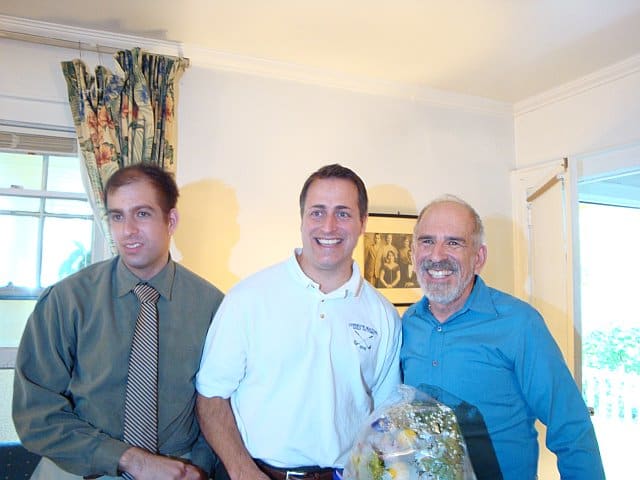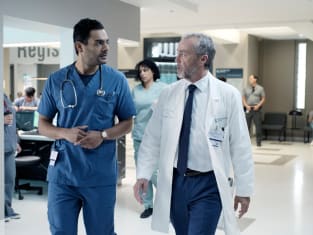Transplant Season 1 Episode 4 Review: Saleh
 Orrin Konheim
at
.
Orrin Konheim
at
.
Medical procedurals on NBC have historically been more comfort viewing than the stuff that wins Emmys. As a result, I didn't have high expectations for Transparent.
However, I thought being that it was produced by Canadian television (which has given us some interesting gems including Schitt's Creek), and since it centered around a Syrian refugeee, it had the potential to stretch the form.
The pilot, Transplant Season 1 Episode 1, was both great fun and promising. In the next two episodes, there was still potential to carry on the show's interesting threads in subsequent episodes: Most notably, Hamed's identity as an immigrant and his MacGuyver-esque abilities.
At its heart, however, Transplant is an ordinary template for a show. It's not that much different from a hundred other medical shows, and while watching Transplant Season 1 Episode 4, I was so overwhelmed by the show's hundrum ordinary-ness that I'm in a state of blah.
As per usual, there were three medical cases and attempts to intertwine them with human drama. In my book, about one and a half out of the three succeeded.
I'm going to make a rule here of what I consider quality: Every medical case should be interesting enough to hold as its own story.
Why? For one, other shows like House and Royal Pains (and you can add your own faves) can easily meet this bar. Great medical dramas often present an ailment as a mystery with the protagonist as a Sherlock-Holmes-like detective who deciphers the mystery over the course of the episode.
Transplant has done that, but it looks like the show was barely trying this time.
The first case was an elderly patient, Mr. Monroe, who fell off his diet when he couldn't resist some cookies and became pale. The exposition for his case was about three sentences long and came at rapid-fire speed, so that's all I could catch.
In and of itself, the exposition for Mr. Monroe serves as nothing more than technobabble. A good medical procedural can translate a parents' problems into more relatable language and get us invested.
While the show squandered the first opportunity, it rebounded by adding human drama later when it revealed Mr. Monroe's connection to a patient who was hit by a driver under the influence of alcohol: He's the drunk driver.
Dr. Leblanc had to decide whether to turn in the elderly patient or leave that up to the patient himself. At least that's something.
Then there was 13-year-old Yasmine, who was showing signs of a stroke. At one point, her mom ran out screaming, and then Yasmine made a full recovery. Seriously, that was it. There was nothing that fell into a textbook definition of dramatic tension.
So why did that plot exist? I mentioned in my review of Transplant Season 2 Episode 2 that when the show uses medical scenarios that aren't fully fleshed-out, it's in service of showing how characters react in various scenarios and developing them further.
Case in point: Dr. Hunter is separated from his family, and that's been tough on him. Hunter's daughter didn't show up for the school's morning attendance, and he panicked. It sets up a heart-to-heart between him and Yasmine's foster mother, who's also (rightfully) worried about parenthood.
This particular sub-plot also puts Hunter and Hamed's bromance to the test, and it gives us a chance to show, once again, how good Hamed is with kids as he consoles the 13-year-old patient.
These little snippets of character development are a high price to pay for swallowing up so many minutes of screen time.
The third medical plot involves our main man, Hamed, remotely using his medical super powers to help a friend in Syria. He assesses the situation and decides that the colleague must do an amputation.
There's also the kind of roundabout character development here that the show aims for: Hunter and Hamed rekindle their bromance over this case, and Bishop stops by to deliver his signature scowling dissaproval.
Although a little thin on the kind of drama about refugee medicine that the show advertises -- we don't know much about the person in Syria or how he is connected to Hamed -- it is a gripping medical case.
It might be a half-success, in that, technically, the medical drama was interesting, but the sub-plot didn't reach its full potential.
As for the overall arcs, a lot of them revolve around various romantic happenings. Dr. Curtis and the security guard are getting it on, while Leblanc and Hamed lament the fact that neither of them can afford a love life.
Let's note here that this is the first time that Doctors Hamed and LeBlanc have been portrayed as sexual beings at all. The current categorization: Too busy to date.
While the season preview teases sparks in the future, there's something to be applauded for showing characters who just don't date.
I know there's not as much of juiciness without hospital romance, but it's an acceptable trade-off for realism. Would a Syrian refugee really be ready to hit the meat market so soon?
Hamed: You don't date?
Leblanc: I've had to accept the fact that the hospital is my current boyfriend. You?
Hamed: I sleep on a sofa so my sister can have a bedroom
There's also a scene between Bishop and Malone about a past romance and how he wants to rekindle it because he's the only one to tell her to piss off. Well if he was so attracted to people who give him backtalk, why is everyone treating him like a four-star general?
Doctor Bishop: You're the only one who's talking about second chances and you're the only one around here who's not afraid to tell me to piss off...so dinner, would you like to?
Malone: Piss off
Here's the thing: Character development on this show (outside of the protagonist) is generally not strong enough to exist without the context of the medical drama. Can you honestly say that any of these parts are written so these actors would be remotely in content for Emmys?
If it appears I'm being hard on this show, I'm not denying that. My question is shouldn't we all be critical? This is a genre of TV that exists on many other channels and time slots that might deserve more of our attention.
I'm not suggesting that all hope is lost, but the show needs better medical plots and to focus on what makes the show unique -- Dr. Hamed's charisma, ingenuity, and his edifying backstory -- to succeed.
What do you guys think? Am I being too harsh on whether the plots were suitably intriguing? Are the side characters developed enough at this point to be interesting? Do you think this show is living up to his potential?
Sound off in the comments and be sure to watch Transplant online right here via TV Fanatic.
Orrin Konheim is a staff writer for TV Fanatic. Follow him on Twitter and his personal blog at Medium.














